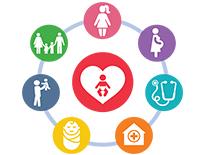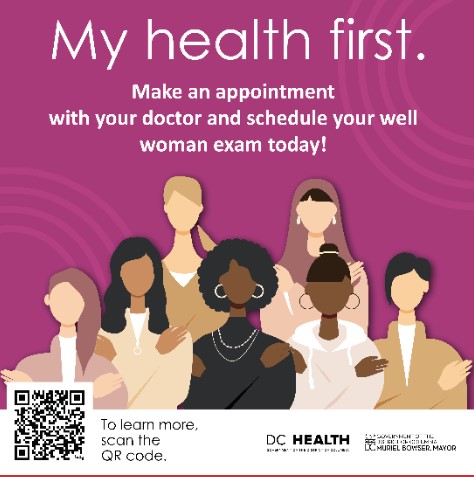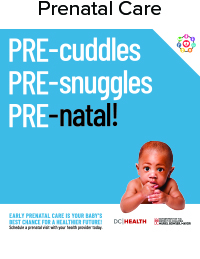
Improving Perinatal Health Outcomes
Improving perinatal health outcomes starts with every community understanding its health risks and its role. To achieve this goal, DC Health’s comprehensive approach works to ensure the following priorities:
- Every teenage girl and woman in DC is in control of her reproductive health.
- Every pregnant woman receives patient-centered, high quality prenatal care beginning in the 1st trimester.
- Every healthcare provider has the tools and resources they need to manage complex social needs of women and infants.
- Every maternal and infant care facility and provider has the tools and resources to practice evidence-based health care and to document QI/QA activities.
- Every newborn receives high-quality neonatal care in the hospital and outpatient setting
- Every parent has the life skills needed to nurture and provide for their family
- Every infant, mom, and dad has a safe and healthy environment to thrive and receive the support they need to promote early childhood development and learning.
These seven priorities fall within four overall strategic areas to eliminate preventable infant deaths and reduce preterm and low-birth-weight births: improving preconception health; assuring high-quality healthcare; strengthening families as they prepare and care for children; and, promoting safe and healthy environments.
Perinatal Health and Infant Mortality Report
- NEW DC Preterm Birth Data Dashboard 2014-2024 - Published 2026
- NEW DC Perinatal Health and Infant Mortality Report 2019-2023 (PDF) - Published 2025
- DC Perinatal Health and Infant Mortality Report 2019-2020 (PDF) - Published 2022
- DC Health Perinatal and Infant Mortality Report 2018 (PDF) - Published 2020
MAP: Health Care Facilities Providing Prenatal Care in DC (PDF)
Perinatal Health Programs
- District of Columbia Perinatal Quality Collaborative (DCPQC):
A network of clinicians, public health professionals, patients and families, and community stakeholders. The collaborative implements clinical data-driven quality improvement strategies and initiatives to reduce maternal and infant health disparities in the District. As part of the Alliance for Innovation on Maternal Health (AIM), the DCPQC engages with birthing hospitals to assess current practices and policies through communities of learning (CoL), clinical implementation working groups, and trainings on respectful care. - Newborn Metabolic Screening Program
Ensures all newborns born in the District of Columbia have screening for metabolic and genetic disorder, and ensures all abnormal screens receive appropriate follow up care. - State Maternal Health Innovation Grant
The State Maternal Health Innovation (SMHI) program aims to implement innovative community-based models of care in the District. DC Health’s mission is to improve maternal health data and surveillance and reduce barriers to reproductive health care and services before, during and after pregnancy. The Maternal Health Taskforce (MHTF) aims to improve maternal health outcomes through collaborative stakeholder engagement, data-driven strategies and ensuring equitable access and support for District families. - Preterm Birth Reduction
Preterm Birth Reduction initiative to implement quality improvement initiatives by institutionalizing best practices in screening, referral, medication therapy, management of risk factors, and coordination of support. Under this grant DC prioritizes DC Medicaid woman and residents of wards 5,7, & 8. - Well Woman Campaign
A grassroots mass communications campaign that focuses on encouraging women to take ownership of their health by increasing the number of women who receive care at FQHCs who visit the doctor for preventative services including receiving a well- woman visit at a FQHC who were screened for the social determinants of health. - LinkU
A comprehensive resource navigation tool, LinkU provides a curated list of support services and public health resources based on the seeker's location. These resources food, housing, behavioral and mental health services, newborn items, education, legal and more - Place-Based Initiatives
Innovative programs located in neighborhoods or housing communities to improve health outcomes for children ages zero to five and their families. These programs meet a critical need to provide multi-generational supports for all the District families who do not want a home visit. - Safe Sleep Program
The DC Health Safe Sleep Program (DC SSP) is designed to educate and empower parents, caregivers, and partnering agencies with information on Sudden Infant Death Syndrome (SIDS), Sudden Unexpected Infant Death (SUID), and safe sleep practices guided by the American Academy of Pediatrics Safe Infant Sleep recommendations. Program participants receive a portable crib (for DC residents only) after education to provide safe sleep environments for infants DC SSP has built and operationalized strong community capacity, by collaborating and sustaining robust working relationships with over 35 organizations (including local hospitals, daycare centers, short-term family shelters, and community organizations) that serve pregnant women and families in the District - Maternal and Child Health Block (Title V) Grant
DC Health is the operator of the District’s State Title V program. The mission of Title V is to improve the health and well-being of the District’s mothers, infants, children, and youth, including children with special healthcare needs (CYSHCN) and their families. DC Title V programs serve pregnant women and parents, children (infancy through adolescence) and children and youth with special healthcare needs. DC Title V engages with stakeholders to assist the District to improve access to healthcare and social support services and outcomes for District families. - Baby Friendly Hospital Initiative
Initiative to implement evidence-based maternity care in District hospitals and birthing centers to achieve optimal infant feeding outcomes and mother/baby bonding. - Chronic Disease Self-Management Program
Evidence-based program to teach DC residents skills (such as learning healthier eating habits; communicating with doctors and making informed treatment decisions) to improve chronic disease (diabetes, hypertension) outcomes. - DC Hears
Ensures all infants born in the District of Columbia receive a newborn hearing screening and all abnormal screens receive appropriate follow up care. - DC Quitline Pregnancy Program
Offers education, nicotine replacement therapy and individual counseling for all District residents. The Pregnancy Program offers enhanced behavioral support through additional counseling sessions and postpartum follow up to prevent relapse. - Healthful Food Access Programs
Programs include farmers market incentive programs and free pop up markets at elementary schools. - Help Me Grow
Systematically connects children at-risk for developmental delays and disabilities with needed services through comprehensive physician and community outreach and centralized information and referral centers. - Immunization Program
Works with families, providers and community partners to ensure children and adults in the District are protected against vaccine-preventable disease. - Maternal, Infant Early Childhood Home Visitation (MIECHV)
Evidence-based home visiting services for at-risk pregnant women and parents with young children up to kindergarten entry. - Perinatal Hepatitis B Prevention Program
Works with clinical providers and birthing facilities to identify Hepatitis B infected mothers and ensure protocols to decrease transmission to their infants. - Perinatal HIV Program
Links HIV positive pregnant women to care and services and following up on the health-status of the infants. - Perinatal Oral Health Program
Education and training to increase awareness of early childhood and prenatal oral health prevention and care for maternal and child health providers and community-based organizations. - Special Supplemental Nutrition Program for Women, Infants, and Children (WIC)
Program services include health assessments, nutrition intervention, education and counseling, breastfeeding promotion and peer counselor support along with a monthly, nutritionally prescribed tailored food package that includes healthful food options. Program services include health assessments, nutrition intervention, education and counseling, breastfeeding promotion and peer counselor support along with a monthly, nutritionally prescribed tailored food package that includes healthful food options. - Supplemental Nutrition Assistance Program: Nutrition Education and Obesity Prevention (SNAP-Ed)
Behavior-based health and wellness educational activities to prevent obesity by promoting increased consumption of healthful foods and daily physical activity for SNAP-eligible residents. - Tobacco Control Program
Provides awareness and education on the harmful effects of secondhand smoke exposure. Efforts include targeted public health campaigns for pregnant women and mothers on the impact of smoking during pregnancy and secondhand smoke exposure; and, training and technical assistance on the health effects of smoking and tobacco use to programs that directly serve mothers and children.
Contact TTY:
711




